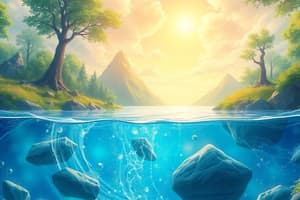Podcast
Questions and Answers
What does the term 'Hydrosphere' refer to?
What does the term 'Hydrosphere' refer to?
- The underground rock layer that contains water
- Cloudy water due to sediment
- The area at the mouth of a river
- All the water on or surrounding the surface of the Earth (correct)
What is the Water Cycle?
What is the Water Cycle?
Cycling of water on Earth through a variety of processes.
What is a Solvent?
What is a Solvent?
A liquid that dissolves substances called solutes.
Define Aquifer.
Define Aquifer.
What is a Watershed?
What is a Watershed?
What is a River Basin?
What is a River Basin?
What is Ground Water?
What is Ground Water?
What is an Estuary?
What is an Estuary?
What does Upwelling refer to?
What does Upwelling refer to?
What does Turbidity measure?
What does Turbidity measure?
What is Potability?
What is Potability?
What does pH measure?
What does pH measure?
Define Acid.
Define Acid.
What is a Base?
What is a Base?
What is Dissolved Oxygen?
What is Dissolved Oxygen?
What does Salinity refer to?
What does Salinity refer to?
What is Water Treatment?
What is Water Treatment?
Define Stewardship.
Define Stewardship.
What is a Shore?
What is a Shore?
What is the Open Ocean?
What is the Open Ocean?
Define Deep Ocean.
Define Deep Ocean.
Flashcards are hidden until you start studying
Study Notes
The Hydrosphere
- Refers to all water present on or around Earth's surface, encompassing oceans, lakes, rivers, and atmospheric water.
Water Cycle
- Describes the continuous movement of water on Earth, influenced by processes like evaporation, condensation, and precipitation.
Solvent
- A liquid capable of dissolving other substances (solutes) during chemical processes.
Aquifer
- Underground rock formations storing significant water resources essential for human use and consumption.
Watershed
- Area of land that collects and drains surface water into bodies of water when soil saturation occurs.
River Basin
- Land area drained by a river and its tributaries, vital for water flow and ecological health.
Ground Water
- Covers underground water sources that are crucial for drinking and other uses.
Estuary
- Coastal area where freshwater from rivers meets and mixes with saltwater from oceans; a diverse habitat influenced by tides.
Upwelling
- Occurs when surface waters are displaced, allowing nutrient-rich water to rise from deeper layers, enhancing marine productivity.
Turbidity
- Measurement of water clarity, indicating the presence of suspended particles or sediments, affecting aquatic life.
Potability
- Indicates the suitability of water for human consumption, influenced by quality and contaminants.
pH
- Scale from 0 to 14 identifying acidity or alkalinity; essential in assessing water chemistry.
Acid
- Any substance with a pH lower than 7, typically characterized by a sour taste and potential corrosiveness.
Base
- Substances with a pH above 7, often with a bitter taste and slippery feel, commonly used in various applications.
Dissolved Oxygen
- The amount of oxygen present in water, crucial for aquatic life survival and ecosystem health.
Salinity
- Measurement of salt concentration in water, influencing organisms' survival and habitat distribution.
Water Treatment
- Processes aimed at purifying water to remove contaminants, ensuring it is safe for human use and consumption.
Stewardship
- Responsibility of conserving and protecting valuable natural resources, including water, for future generations.
Shore
- Marine ecosystem shaped by tidal movements, hosting species adapted to fluctuating conditions and diverse habitats.
Open Ocean
- Expansive marine ecosystem relying on algae as primary producers, playing a key role in global oxygen production.
Deep Ocean
- Marine ecosystem characterized by reliance on chemical energy sources, independent of sunlight, supporting unique life forms.
Studying That Suits You
Use AI to generate personalized quizzes and flashcards to suit your learning preferences.




